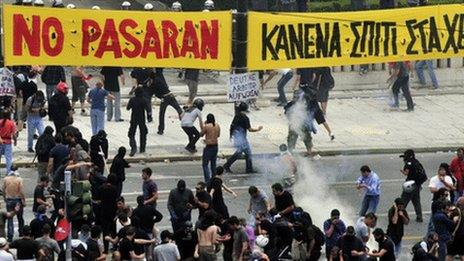Greece crisis: Bail-out options assessed
- Published
- comments

PM Papandreou (left) and his new finance minister face a tough battle to balance Greek finances
After all the papering over, the fudging and the hopes that defied experience comes the reckoning.
Just over a year ago Greece was bailed out with a fund of 110bn euros. The country's problems were adjudged to be ones of illiquidity.
They were not. Greece was insolvent. All that has happened since is that Greece's debt burden has risen.
There was a slight reduction in the budget deficit but targets were missed. In the meantime the economy - apart from the tourist industry - has gone into freefall.
The austerity prescription has not worked. Since the bail-out, 400,000 have joined the unemployment lines.
A year on it is impossible to disguise the reality of the crisis. The tensions are tearing away at the fabric of Greek society and at the foundations of the European Union.
President Sarkozy yesterday betrayed the tension when he said: "Without the euro there is no Europe and without Europe there is no possible peace and security."
In raising the stakes to make this a crisis about peace in Europe he is trying to frighten European leaders.
The French president's fear is almost certainly exaggerated. There is no threat to security.
The euro would survive the exit of Greece - the European Union existed before the euro and no doubt would survive a contraction the euro-zone.
Would there have to be a re-think about where the EU was heading? Certainly, but some would welcome that.
So what are the options?
More of the same
The likely winner, this will involve a bail-out mark 2. More austerity will be imposed with the hope that somewhere down the road Greece finds the growth to reduce its debt burden.
But, as I have written before, almost no economists believe it is possible.
Even if Greece were to deliver on its proposed privatisations, even if it were to discover growth of 3%, even if there was to be a voluntary restructuring by private investors, even if the government were to deliver on savings, it would only dent the debt mountain.
So a default will be postponed now but will be back on the agenda later. In the meantime private investors will shun Greek bonds.
When the default comes, it will be European governments and their taxpayers who will take the hit.
The Greeks resist
It is possible that the Greeks will take matters into their own hands and resist the terms of a second bail-out. Germany, the IMF and others have made it clear that in that case no new funds will be made available and Greece will head to bankruptcy.
The expectation has to be that the Greek parliament will vote for the new bail-out deal but the mood of the people has become volatile and unpredictable.
More and more of the protesters are talking about humiliation and the loss of sovereignty.
As one writer in the Financial Times put it: "Democracy was supposed to have put an end to foreign servitude."
So the Greek people cannot be taken for granted. A quarter of civil servants who have already seen their salaries cut by 20% stand to lose their jobs. History teaches that nations can reach a tipping point.
But the smart money is that come Tuesday, Prime Minister George Papandreou will win the vote of confidence. The best he can offer is: "Apres moi le deluge."
But even if he wins he'll be a weak leader and how, in those circumstances, he can deliver on privatisations is very unclear.
Default
This is the option that European leaders, banks and European officials fear most.
They fear it because of the threat of contagion - that Ireland, Portugal, Spain and others will follow.
A default in itself should not undermine the European banking system. The French banks have an exposure to Greek debt of 56bn euros, the German exposure is 34bn euros. The fear lies in the unknown.
What if there is a so-called Lehman moment, when the financial herd panics and lending dries up?
For Greece, of course, default would mean a run on the banks but, in any event, already there are heavy withdrawals.
For a period Greece would be shut out of the markets but, outside the euro, it could devalue and build again.
Nobody can pretend it would be an easy option.
Fiscal and political union
Some are arguing in Brussels that in the end the European Union will have to shoulder Greece's debts.
That mainly means the German taxpayer. That would be a giant step towards the EU becoming a transfer union and you can only really accept that in a political union.
Some privately may be hoping for that but Europe's voters would have to have a say and, in their current mood, may reject the idea out of hand.
The British dilemma
Germany would like some of the funding for a Greek bail-out mark 2 to come from the EU's emergency fund, the European financial stabilisation mechanism.
Under a deal struck by the former Labour Chancellor Alistair Darling, Britain would have to pay 12% of any loan guarantees.
At a time of severe cuts in the UK the government will be under intense pressure to block such a commitment. But it will be decided on majority voting.
Some will urge the government to mount a legal challenge but the chancellor made clear to me recently in Budapest that the coalition would not chose a major row with Europe.
However, this time around Tory back-benchers will be more vocal.
Almost certainly there will be a fudged deal backed by a Micawberesque hope that something will turn up. It might buy some time but the big questions will not have been answered.
Ultimately, will European tax-payers be prepared to absorb Greece's debts as the price for saving the euro-zone?
- Published15 June 2011

- Published21 May 2011
